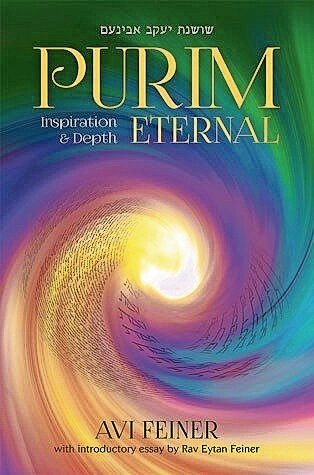Joyous ‘Purim Eternal: Inspiration and Depth’
In an essay titled “Double Adar,” Rabbi Berel Wein writes that “there is an underlying value that the month of Adar possesses that no other month in the Jewish calendar can lay claim to. This idea of the joy of survival, of the ultimate downfall of the wicked, of the better tomorrow in physical, spiritual and national terms, belongs exclusively to Adar. There is no substitute for it in the rest of the year’s calendar.”
It is from this observation that we proceed to the teachings of Rabbi Avi Feiner of Lawrence, reflected in this excerpt from his book, “Purim Eternal: Inspiration and Depth’ (Mosaica Press, 2019).
• • •
“And these days should be remembered (nizkarim) and celebrated in every generation.” This verse is the source for many of the laws regarding the mitzvah of reading the Megillah, and may be the actual source for the obligation to read the Megillah on Purim. The Gemara even labels the mitzvah of reading the Megillah as one of zechirah, meaning remembrance.
But why is Megillas Esther called “remembrance?” If it is because the main purpose of the reading is to commemorate the miracle, then why not refer to all of the mitzvos of Purim as a remembrance or commemoration? Are not the mitzvos of seudas Purim, mishloach manos, and matanos l’evyonim also commemorations of the great miracles that occurred at the time of Purim?
To gain a greater understanding of the word zecher (or zechirah), let us look back to find the first time that this word appears in the Torah. There is a famous principle brought from Rav Tzadok HaKohen m’Lublin that the essential meaning of a word can be best understood by analyzing the first time that word appears in the Torah.
The first place that a form of this word zecher (to remember) appears in the Torah is in Parashas Noach. The verse states, “Vayizkor Elokim es Noach … vayashochu hamayim (And Hashem remembered Noach … and the waters subsided).” Hashem’s remembrance of Noach took place while he was inside the teivah in the midst of the Great Flood, and it was this remembrance that ultimately prompted Hashem to cause the waters to subside.
Rashi on this verse explains that obviously Hashem never forgets anything and therefore has no need to “remember.” Rather, G-d’s remembrance signifies that the attribute of Hashem’s strict judgment (Elokim) was now substituted with the attribute of Hashem’s mercy, which became manifest as a result of the tefillos of Noach.
We see from Rashi’s explanation that zechirah refers to the vehicle of tefillah that causes Hashem to display mercy — even when mercy may not be deserved. …
The Purim story is a story of Hashem listening to our tefillos and pouring out His incredible compassion and kindness toward His children. That is precisely why the Megillah is called a “remembrance,” because it reflects how tefillah can prompt Hashem to “remember” His covenant with His nation and to save them, even when they do not necessarily deserve to be saved. …
Just as Hashem “remembered” Noach in the time of the Flood and caused the boiling and destructive waters to cool down, so too in the time of Purim, Hashem ‘remembered’ Mordechai, Esther, and the Jewish people, and His attribute of strict justice was thus similarly cooled down. The Gemara in Megillah even suggests that when the verse says that the king’s anger subsided, it may not only be referring to Achashveirosh’s anger, but may also be a reference to the cooling down of the anger of the King of the World.
Therefore, it is very appropriate that Megillas Esther be called a “remembrance.” Not only does reading the Megillah enable us to recall and to publicize the tremendously miraculous events that occurred, but it also teaches us how we can cause Hashem to “forget” about His attribute of strict judgment and to instead “remember” His love and compassion for the Jewish nation.
Even if we are undeserving, we must pour out our hearts in prayer and supplication, and through the vehicle of tefillah we can cause Hashem to suppress His anger and instead pour His great mercy and rachamim upon us.
A version of this column was published in 2019.

 44.0°,
Mostly Cloudy
44.0°,
Mostly Cloudy 




